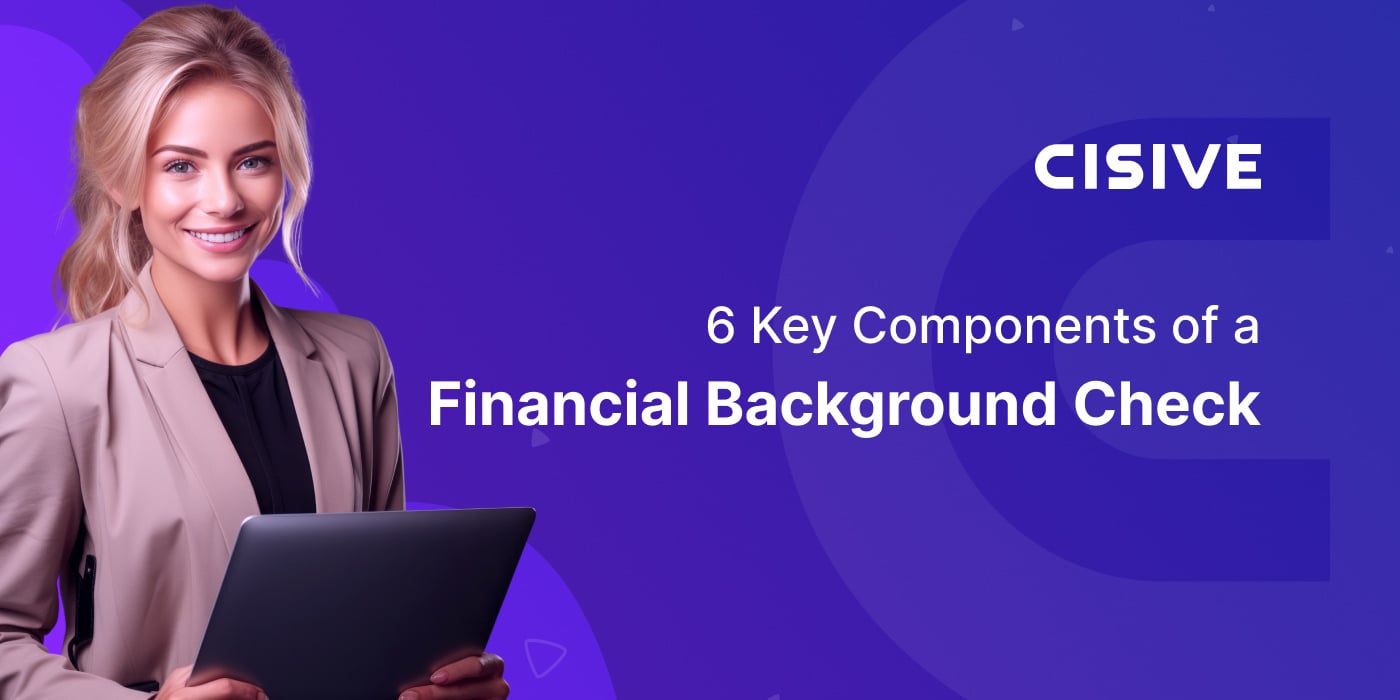

Vendor relationships are the backbone of modern financial services operations, handling such areas...

An employee’s integrity is every bit as important as their skills. If you’re involved in hiring, you know how important it is to find trustworthy candidates. This is particularly true for financial services, healthcare, tech, or other industries where employees have access to sensitive material.
Hiring someone without understanding their financial history can expose your company and customers to risks such as fraud, embezzlement, and regulatory non-compliance. Doing financial background checks on candidates helps mitigate risks and protect your company and customers from applicants who have committed financial crimes. And effectively communicating each step of the background check process provides a good experience for the candidates you do want to hire.
In this guide, you’ll learn how financial background checks work and how you can implement them effectively. We’ll also cover how you can remain compliant in the hiring process for heavily regulated industries.
Key TakeawaysHere are the key things you need to know about financial background checks:
|
A financial background check typically looks into a candidate’s credit history. The purpose is to assess the person’s financial responsibility. It looks at how the person uses credit, whether they’re subject to civil judgments, or whether they have other financial liabilities.
In short, this screening is intended to highlight anything precarious about the candidate’s financial situation. It aims to flag characteristics that could incentivize them to behave badly in order to correct or alleviate these pressures.
The financial background check or financial screening should not be confused with a criminal history check. If a candidate has been convicted of a financial crime, that conviction would show up in the criminal records check. It would not necessarily appear in the financial background check (although it may show up in both).
Banks, healthcare providers, and employers in other enterprise industries should perform both types of checks. This is because someone could have a clean criminal history but still pose a risk to the organization. As such, companies in these types of industries usually conduct more in-depth checks than companies in other verticals.
Financial services companies are in the business of understanding risk and making decisions based on that understanding. Background checks are key to understanding the risks involved in hiring a candidate and giving that person access to sensitive financial data.
An in-depth check lets you see the candidate’s financial behaviors in black and white. You can then make an informed decision as to whether you believe this candidate will protect your customers’ assets.
Further, financial background checks can help you ensure that the candidate is qualified for the position. For example, you may be able to verify whether the person actually holds a license or other credential listed on their resume.
Similarly, these checks can identify whether the candidate has been disciplined by the Financial Industry Regulatory Authority (FINRA) or other regulatory bodies. It can even show if the person has been sanctioned for misconduct in another country.
Additionally, financial companies are required by law to conduct certain due diligence prior to hiring. Failing to conduct adequate background checks before hiring applicants can expose your company to legal consequences should the employee commit some misconduct while working for you.
Information security is paramount in finance. Hiring employees without properly vetting them heightens the risk for your company. You might bring someone on board who makes company or client information accessible to the outside world. Whether the person steals the information or accidentally leaks it, your company could be subjected to legal and reputational risk.
Conducting financial background checks helps you:

There is no universal standard for what is included in a financial background check. The screening can be different depending on the company that conducts it and the regulations in the area where the applicant lives. Note too that there are ethical considerations to consider with each check; we provide some guiding principles to follow below.
Here are some of the elements that are often part of a financial background check:
Note that checking some of the items listed above may not be legal in all jurisdictions. For example, in Philadelphia, it is unlawful to conduct credit screening unless an exception applies. Other cities and states have similar rules in place.
Such laws are based on the idea that having a poor credit record is not a good indicator of financial irresponsibility. For example, a person could have bad credit because an illness prevented them from working and their bills piled up and went unpaid.
Make sure you understand the laws in the jurisdiction where your candidate lives before you run certain types of background checks. A seasoned background check provider like Cisive will help you remain on the right side of the law.

Financial background checks are best done as part of the hiring process. You don’t need to do one for every applicant; you’ll want to conduct them only for candidates you intend to hire.
Financial checks can be done at the same time as background checks and other verifications. These checks all serve the same general purpose: doing your due diligence to ensure the candidate is who they say they are and that they’ll do the job responsibly.
Understanding your company’s needs is the first step toward creating a solid financial screening process. The needs may also vary based on the positions for which you’re hiring: You want deeper checks for senior-level people, for example.
Once you understand your needs, you’ll want to decide the best way to request the checks. Typically, working with a third party is more efficient and cost-effective than obtaining all the checks yourself.
If you do it yourself, you’ll need to contact all the relevant agencies, order reports from them, and handle all the communication with your candidates. This is a time-consuming process with many moving parts, and it can be a major drain on a hiring department.
Employers must comply with the Fair Credit Reporting Act (FCRA) when running financial background screens. As noted above, there may also be additional regulatory requirements based on the city and state where your candidate lives.
Usually, it’s safest to rely on a proven partner like Cisive. We have automated tools to keep you in compliance and take the burden off your team.
Here are some best practices for how to conduct financial screenings:

As mentioned above, some jurisdictions have laws barring certain types of background screening. But legality should not be your only concern. Consider ethics as well.
When recruiters and HR professionals conduct financial background checks, there is a risk of potential bias or discrimination. For example, low-income individuals are often hurt by these checks. There are also privacy concerns regarding sensitive data.
To conduct background checks ethically, keep in mind some important guiding principles:
Tell applicants about the scope of the financial screening and how you will use the results.
Ensure that you get the candidate’s written consent prior to conducting the screening.
Use the information gained from the screening for its intended purpose only.
Allow candidates to clarify or dispute any findings that they don’t believe are accurate.
Information from the background check should not be shared with anyone other than those who need it to advance the hiring process.
Ethical background checks can become more achievable through the use of technology. When you order checks through a proven provider like Cisive, you can be confident that the technology used will help you:
Finally, being ethical means fairly weighing the results of the background check. If a check reveals something questionable about a candidate, think about it in context. For example, how long ago did the behavior happen? How severe was the issue? Does the person have any other red flags?
When an issue is revealed, you may want to discuss it with the candidate and give them a chance to explain. There could have been a life event that triggered the behavior. Or there could simply be a mistake in the report.
Like so many aspects of business, the hiring process is using technology more and more. Specialized background check software will include automated screening. The automation can be integrated with an applicant tracking system (ATS) and other HR tools to streamline the hiring process.
Software that includes automation can assist with getting an applicant’s consent for the screening. Once that happens, it can collect data about the candidate from many sources, verifying more of the information the candidate put in their application. It even provides candidates with copies of the screening results.
As usual, laws are playing catch-up. Data privacy will continue to be a big topic for legislators in the U.S., Europe, and Asia. In the U.S., states and cities are passing their own laws.
Each jurisdiction will pass new laws at different times, and those laws may contradict each other. Because of the patchwork nature of such regulations, companies should protect themselves by having financial background checks performed by a capable partner.
Thorough pre-employment screening is important for all employers, but it’s essential in sensitive industries like financial services, healthcare, and technology. HR teams should adopt robust screening practices to mitigate risks.
The data your customers provide as they do business with you must always be handled carefully. Understanding the financial habits of your applicants can give you insight into how that candidate may manage financial data and other sensitive information.
Cisive is a leading provider of financial services background checks. Our tools are powerful, accurate, and efficient. Everything we do is backed by the knowledge and experience of dedicated people who are available and responsive whenever you need guidance.
Reach out to a Cisive expert today to find out how we can help you with your hiring and background screening process.
Author: Vaun Longhorn
Bio: Background screening expert with expertise in financial services at Cisive.
Let's Connect on LinkedIn
Vendor relationships are the backbone of modern financial services operations, handling such areas...

In the financial services industry, where trust, compliance, and accuracy are paramount, staying...

Financial institutions face a unique challenge: hiring quickly to stay competitive while meeting...